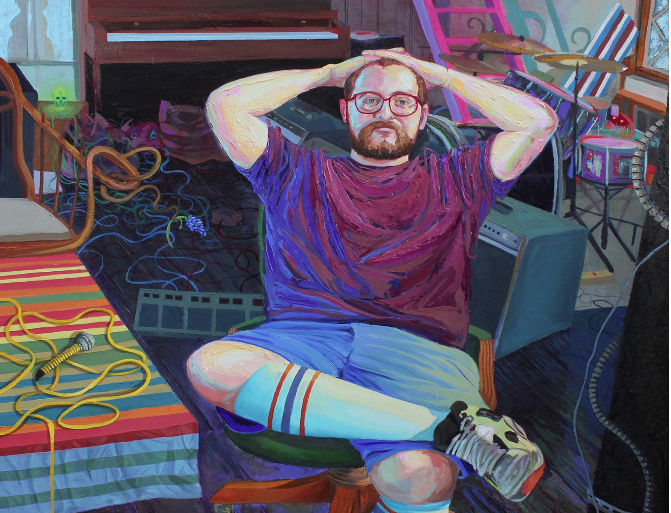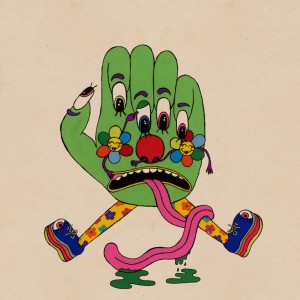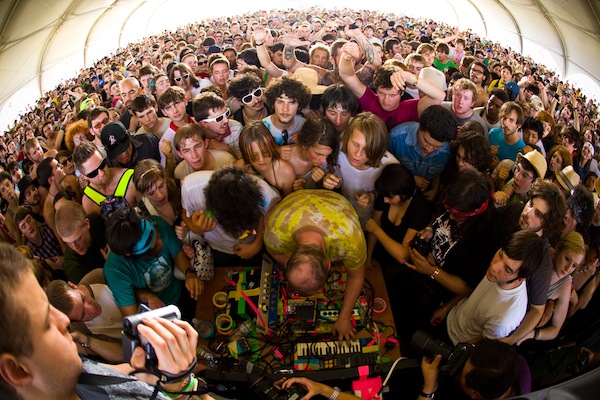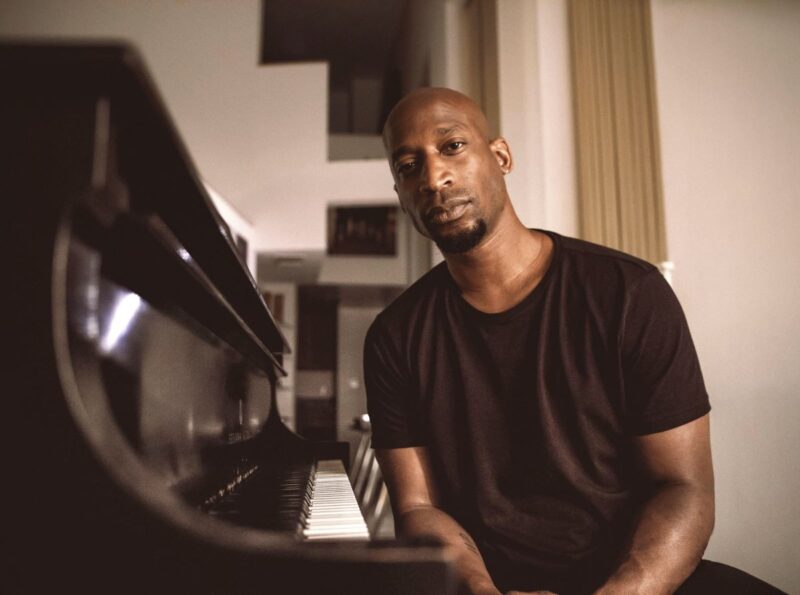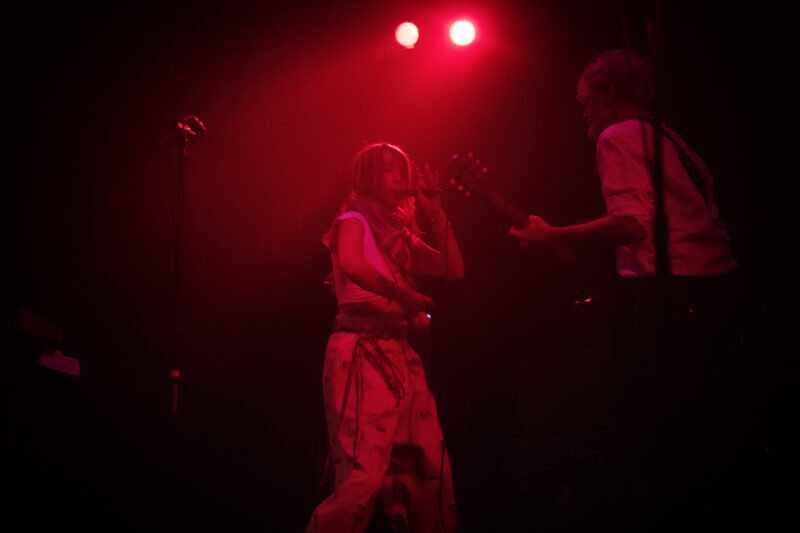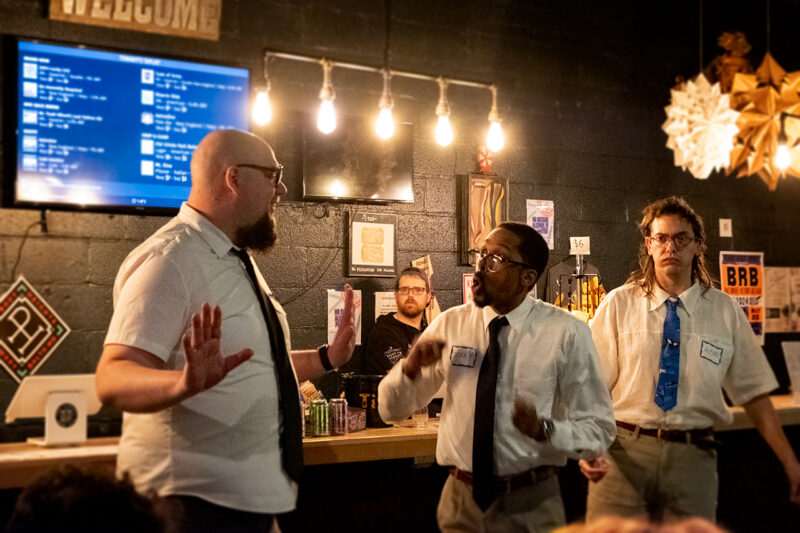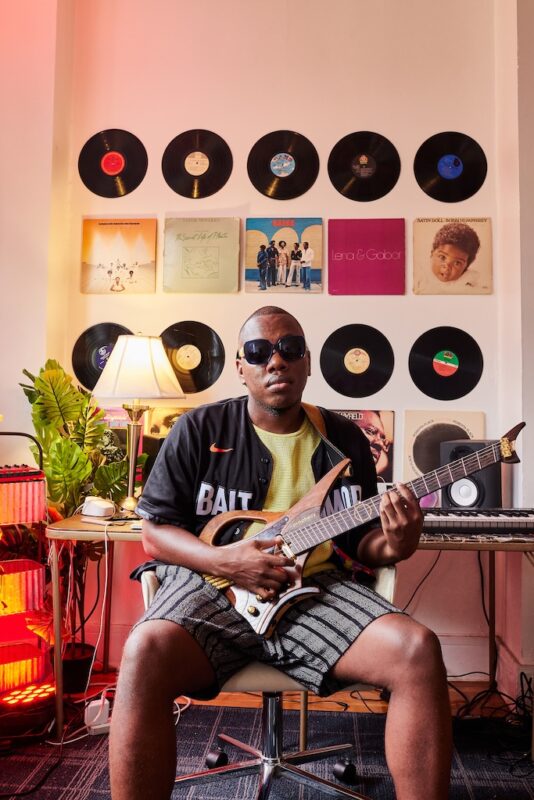With his newest album Baltimore’s Dan Deacon has learned how to relax.
by Taylor DeBoer
Originally my interview with Baltimore electronic musician Dan Deacon was supposed to be at his studio on Charles Street in Station North, but due to beltway traffic, Dan was unable to get there. I took it as yet another opportunity to drink a Manhattan across the street at Club Charles and we rescheduled for the following day.
We ended up speaking on the phone for nearly an hour about his new album, Gliss Riffer, due out February 24 on Domino. After the success of America and several years of worldwide touring, Deacon has scaled back a bit on this one, making and producing the album on his own.
“While on the America tour I started to think about how I used to make music, with Casios and drum machines,” Deacon says. “I wanted to make an album that was all inside of the computer, but informed by the process of making acoustic music that I learned from Bromst and America.”
Deacon rambles but not aimlessly. Our conversation, which was cut short because of another interview, could have gone on for hours.
“Believe it or not, I came from a rock perspective. I’m more informed by They Might Be Giants than Aphex Twin.”
Deacon’s electronic style, which he claims is not pop music, but also not experimental, has always been filled with lush arrangements, dancey riffs and catchy hooks.
Gliss Riffer is not only different from America in its musical style and landscape, its lyrics are more self reflective and his own voice has a more prominent role on the LP.
“Why do I have so much anxiety and self doubt? Writing this album helped me deal with those things,” he says.
“Learning How to Relax,” the album’s second single, is a manic, bouncey tune inspired by the pressure and anxiety of making another album, which is like re-applying for a job, according to Deacon.
“I heard this quote once about doing your best work when you’re relaxed and it just blew my mind,” he says. “I used to use stress as a motivator and I don’t want to live my life running from one burning building to another.”
Deacon’s anxiety doesn’t just manifest itself through music, though. He also thinks a lot about shifting consciousness.
“I wouldn’t expect the universe to think the same way a human can,” he ponders, “I guess it’s insane to think about a jealous universe, but I also don’t want to dismiss the possibility.”
While contrarian in his mindset, Deacon’s deep thoughts about a human-like universe on a phone call with a random music writer is what makes Dan Deacon, as a regular guy, so easy to like.
“I guess it’s just arrogant to think those things don’t exist because we don’t see them,” he says.
After a big year that included opening slots for Arcade Fire and Flaming Lips, Deacon is ready to embark on a tour behind Gliss Riffer. The clubs that he’ll play this spring will feel quite different from the basketball arenas and amphitheaters he played as the opening act.
“That was a gigantic opportunity for me. Most of the nights when I started playing, only about half the crowd was there and I really had to put it all out there. People that go to basketball arenas to see shows probably only go to a few shows a year.”
Unlike so many Baltimore musicians that have found broad success, Deacon didn’t leave Baltimore and remains a fixture in the city’s scene.
“This is where my life is. It wouldn’t make sense to live anywhere else.”
That’s not to say it’s without its problems, though. He realizes that as his popularity has grown, there aren’t many venues for large crowds.
“Before the The Crown opened [in 2013] it was a real wild scene. Ten years ago it was a lot easier to throw a 500 person rager in a warehouse,” he says. “Once you get to a point where you can’t play those small shows at clubs you run into limitations.”
He says now that he achieved some success, there is more pressure to make music.
“When I started I was living in the Copycat and eating out of a dumpster and the consequence of the future was irrelevant to the process,” he says.
He’s also very aware of how the scene has changed since he started making music after college in the mid 2000’s.
“If I started being a musician right now would I be the same musician as when I first discovered computer music in junior high? Probably not.”
That being said, he understands that computer-based music is a very new trend in music’s storied history.
“What would I have done if I was born in the 1700’s? My instrument is a computer,” he says.
Deacon compares his career to one of his favorite punk bands from the 90’s called Come On. While they managed to play at CBGB where bands like Television, The Ramones, The Talking Heads, and Blondie took the stage, they never became mega-huge and always skated just beneath the surface of popular music.
“I don’t know, maybe I just like them because their guitarist went to SUNY-Purchase where I went,” he laughs.
Gliss Riffer is out February 24 on Domino. I hope to run into Dan somewhere in Baltimore on a night out or at his favorite coffee shop, The Canteen. I’d love to hear him ramble on about anything, really.
“I’m making music so I don’t go insane,” he says bluntly toward the end of the interview. “Why would someone take 40 minutes to listen to an album anymore? I’m just lucky anyone cares.”
Author Taylor DeBoer grew up in the Baltimore area and studied Writing and Sociology at Loyola University Maryland. He is a local writer, music lover, and edits a website that he co-founded, Manikmusic.net. Follow him on Twitter at TayDeBoer23.
*Top Image: Detail from Painting of Dan Deacon by Baltimore artist Brooks Kossover.


